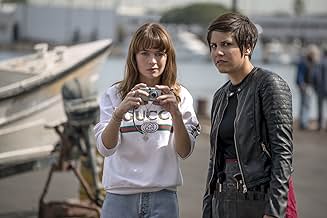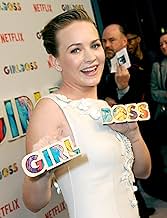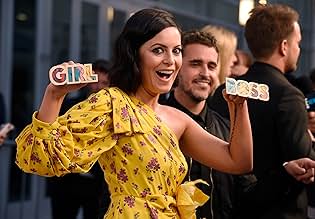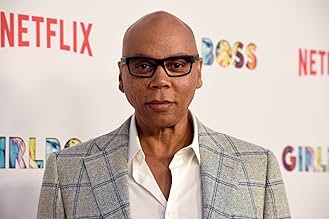Sophia, a misfit, discovers a passion for fashion, becoming an unlikely businesswoman in the process. As her business grows, however, she has to learn to cope with life as her own boss. This... Read allSophia, a misfit, discovers a passion for fashion, becoming an unlikely businesswoman in the process. As her business grows, however, she has to learn to cope with life as her own boss. This show is loosely based on the true story of Nasty Gal Founder, Sophia Amoruso.Sophia, a misfit, discovers a passion for fashion, becoming an unlikely businesswoman in the process. As her business grows, however, she has to learn to cope with life as her own boss. This show is loosely based on the true story of Nasty Gal Founder, Sophia Amoruso.
Browse episodes
Featured reviews
Seems that most of the reviews are bashing the character flaws of "Sophia", but nobody seems to be crediting the actress (Britt Robertson) for giving such a great performance that her portrayal of this character is capable of sparking such a reaction of contempt.
I admit, I really enjoyed another of her earlier shows: "Life Unexpected"
In both cases, Britt is fun to watch. As an actress, she finds the sweet spot between being lovable and having an old-school punk rocker attitude.. like some adorable cross between Patti Smith and Joan Jett.
PS: did they ever actually say who the story is (very loosely) based on?
update: apparently, the "inspiration" isn't very inspirational..
http://www.telegraph.co.uk/tv/0/real-girlboss-rise-fall-nasty-gal- founder-sophia-amoruso/
I admit, I really enjoyed another of her earlier shows: "Life Unexpected"
In both cases, Britt is fun to watch. As an actress, she finds the sweet spot between being lovable and having an old-school punk rocker attitude.. like some adorable cross between Patti Smith and Joan Jett.
PS: did they ever actually say who the story is (very loosely) based on?
update: apparently, the "inspiration" isn't very inspirational..
http://www.telegraph.co.uk/tv/0/real-girlboss-rise-fall-nasty-gal- founder-sophia-amoruso/
This show is so much deeper than it first appears, the most important thing is to stick with it. It starts by presenting itself as another 'quirky' girl comedy and within the first episode shatters that illusion, while still going back to it on occasion. As the series progresses it gets closer and closer to reality, with problems and issues coming up, sometimes being resolved, sometimes not, just like life.
You know the feeling when you are walking down the street and you think you look cool and everything is great, and then five minutes later something happens or you remember something and you feel rubbish and like everything is terrible, then five minutes later you are smiling and happy again? That is what this show comes close to capturing. In an effort to showcase real life even further it also has moments of the sheer mundane, like a joke you and your friends love but anyone listening would find stupid, it's not funny but you can appreciate it because you can relate.
Overall it is another case of a show that could never have been made if not for Netflix, it takes risks and at times really captures some great and insightful moments, sometimes it misses but at least it tries, unlike a lot of safe network shows that pretend to be progressive or 'edgy'. The only general complaint might be that the female lead is mostly annoying as a person, but she is meant to be, and she is called on it more often than not. She's not completely likable, but she is relatable, at least to a degree. Either way it shouldn't let you be put off a show that has a lot more thought and heart than it maybe first gives off.
You know the feeling when you are walking down the street and you think you look cool and everything is great, and then five minutes later something happens or you remember something and you feel rubbish and like everything is terrible, then five minutes later you are smiling and happy again? That is what this show comes close to capturing. In an effort to showcase real life even further it also has moments of the sheer mundane, like a joke you and your friends love but anyone listening would find stupid, it's not funny but you can appreciate it because you can relate.
Overall it is another case of a show that could never have been made if not for Netflix, it takes risks and at times really captures some great and insightful moments, sometimes it misses but at least it tries, unlike a lot of safe network shows that pretend to be progressive or 'edgy'. The only general complaint might be that the female lead is mostly annoying as a person, but she is meant to be, and she is called on it more often than not. She's not completely likable, but she is relatable, at least to a degree. Either way it shouldn't let you be put off a show that has a lot more thought and heart than it maybe first gives off.
Adulthood is where dreams go to die, bankruptcy is where companies go to die. It's unfortunate that whilst this series fanatically praises Nasty Gal founder Sophia Amuroso (here, she is called Sophia Marlowe)as a business success, in life Amuroso has stepped down as CEO and the company is bankrupt.
Sass alone does not make success but fictional Sophia seems to get by simply on being a sassy millenial. She starts the series as a twenty-three year old shoplifting drifter, who is stuck in teenager mood (where she basically remains throughout the whole series)and ends up a girlboss (the kind of patronising term you might use on marketing a Barbie doll).
Though the first three or four episodes are unbearably smug, Britt Robertson does a good job as little-girl-lost Sophia, seller of vintage fashion. Ellie Reed is fine enough as Sophia's hanger-on/best buddy Annie.
It's not so much the acting that's the problem as the whole concept being flawed. It's free publicity for the Nasty Gal business and no amount of dramatic license will disguise the fact that this is a six and a half hour commercial.
The reality is sanitised in the show. For starters, there is whitewashing (Sophia Amuroso is of Greek, Italian and Portuguese descent). Secondly, in this version Sophia is still in contact with her dad, with a relationship no more strained than any young daughter. When we know that he can bail her out financially, her decision to shoplift is bratty rebellion rather than financial problems.
The material was pretty thin anyway so unsurprisingly it did not get a second season.
Sass alone does not make success but fictional Sophia seems to get by simply on being a sassy millenial. She starts the series as a twenty-three year old shoplifting drifter, who is stuck in teenager mood (where she basically remains throughout the whole series)and ends up a girlboss (the kind of patronising term you might use on marketing a Barbie doll).
Though the first three or four episodes are unbearably smug, Britt Robertson does a good job as little-girl-lost Sophia, seller of vintage fashion. Ellie Reed is fine enough as Sophia's hanger-on/best buddy Annie.
It's not so much the acting that's the problem as the whole concept being flawed. It's free publicity for the Nasty Gal business and no amount of dramatic license will disguise the fact that this is a six and a half hour commercial.
The reality is sanitised in the show. For starters, there is whitewashing (Sophia Amuroso is of Greek, Italian and Portuguese descent). Secondly, in this version Sophia is still in contact with her dad, with a relationship no more strained than any young daughter. When we know that he can bail her out financially, her decision to shoplift is bratty rebellion rather than financial problems.
The material was pretty thin anyway so unsurprisingly it did not get a second season.
Netflix (2017) show "Girlboss" is inspired by the best-selling book #Girlboss by Sophia Amoruso, founder of the fashion brand Nasty Gal. It has built a realistic mid-twenties character who still struggling with morality, sense of purpose, keeping up with technology and balancing a bank account. So, there are a lot of funny moments. Soundtrack is rock solid. The script is consistent. For a comedy, the cinematography was impressive. Cast wise, Britt Robertson as 23-year-old Sophie is amazing. While her character has many flaws - given her tendency to often be selfish, brash, inconsiderate and mindless of other people's feelings - Robertson is never insufferable and we are still able to support her even when she acts in a less than positive way. Obviously, Robertson has fun in the role. Despite some flaws, this comedy makes for a brisk binge. At the end, your enjoyment of "Girlboss" will come down to your ability to tolerate its protagonist's demeanor, but Sophie is on a learning curve because no one in her life had ever had faith in her. And that is why I really liked the show.
Rating: 7+/8-
Rating: 7+/8-
But this show is nailing it!
In episode 1 of 'Girlboss', we are introduced to Sophia. She's not necessarily likable. She definitely beats to her own drum, but that particular drum isn't one that the audience will necessarily appreciate for its rhythm and timbre. She is rude to her boss, demanding to her not-one-night-stand, and obstinate to her father who is reasonably worried about her future. Regardless, the show makes the audience care for Sophia because we get a look at her when she thinks no one is watching. After she angrily 'quits' her job at a shoe store and she is on the phone with a friend, she tells her friend to hold on because an ambulance is raging by, when in fact she uses the break to allow a tear to escape. She knows she's an asshole. She knows she's impossible. The audience will know the struggle, because we were all impossible assholes in some measure at some point in our lives.
The show's brilliance lies not, however, in the troubled young adult that is our lead. We've seen troubled young adults in many a show and movie, they are an old and bored trope. No, the show thrives when it shows us the moments in which Sophia is letting her true self speak. In fact, when Sophia says 'I know I don't know anything. And I know I am supposed to, so I'm going to figure it out, I will.', I personally felt relieved. Finally a young adult who admits to not knowing anything at the beginning of a narrative, as opposed to one acting like they know everything only to find out that they don't know crap the hard way, 2/3 into the story-line. As she stands in front of a vintage shop's mirror, checking out a top and considering whether to take it, the reflection in the mirror shows us she is imagining an over the top, wonderfully fashionable and dramatic look, fur coat and all. It is casually edited into the shot, and no special attention is paid to it, because this is just how Sophia's brain works. I, personally, can't wait where else Sophia's brain is going to take the show when the story allows it to come out more often.
The show is not perfect. Running out of gas at the top of a hill with no one coming to help is not realistic, and stealing a rug with the shopkeeper's comment as 'oh, okay' being the only objection even less so. They try a little too hard to claim the 'own drum' characteristic that shapes our protagonist, and take away from the empathy that is needed for the audience to really want Sophia to succeed.
But I do still want Sophia to succeed. The mirror-image trick is repeated at the end of the first episode, when an idea strikes Sophia and she makes her first move to become a 'girlboss'. (Much as I like the first episode of this show, I hate the 'cutesy' title.). Her mirror image is bathed in golden lighting, but not until the camera turns do we see it is not just her imagination this time. She has seen the light, and darn it if that doesn't spur her to immediately take action in an attempt to get her act together. Now let's just wait and see if the rest of the season answers our want to see Sophia succeed and actually get that act together.
In episode 1 of 'Girlboss', we are introduced to Sophia. She's not necessarily likable. She definitely beats to her own drum, but that particular drum isn't one that the audience will necessarily appreciate for its rhythm and timbre. She is rude to her boss, demanding to her not-one-night-stand, and obstinate to her father who is reasonably worried about her future. Regardless, the show makes the audience care for Sophia because we get a look at her when she thinks no one is watching. After she angrily 'quits' her job at a shoe store and she is on the phone with a friend, she tells her friend to hold on because an ambulance is raging by, when in fact she uses the break to allow a tear to escape. She knows she's an asshole. She knows she's impossible. The audience will know the struggle, because we were all impossible assholes in some measure at some point in our lives.
The show's brilliance lies not, however, in the troubled young adult that is our lead. We've seen troubled young adults in many a show and movie, they are an old and bored trope. No, the show thrives when it shows us the moments in which Sophia is letting her true self speak. In fact, when Sophia says 'I know I don't know anything. And I know I am supposed to, so I'm going to figure it out, I will.', I personally felt relieved. Finally a young adult who admits to not knowing anything at the beginning of a narrative, as opposed to one acting like they know everything only to find out that they don't know crap the hard way, 2/3 into the story-line. As she stands in front of a vintage shop's mirror, checking out a top and considering whether to take it, the reflection in the mirror shows us she is imagining an over the top, wonderfully fashionable and dramatic look, fur coat and all. It is casually edited into the shot, and no special attention is paid to it, because this is just how Sophia's brain works. I, personally, can't wait where else Sophia's brain is going to take the show when the story allows it to come out more often.
The show is not perfect. Running out of gas at the top of a hill with no one coming to help is not realistic, and stealing a rug with the shopkeeper's comment as 'oh, okay' being the only objection even less so. They try a little too hard to claim the 'own drum' characteristic that shapes our protagonist, and take away from the empathy that is needed for the audience to really want Sophia to succeed.
But I do still want Sophia to succeed. The mirror-image trick is repeated at the end of the first episode, when an idea strikes Sophia and she makes her first move to become a 'girlboss'. (Much as I like the first episode of this show, I hate the 'cutesy' title.). Her mirror image is bathed in golden lighting, but not until the camera turns do we see it is not just her imagination this time. She has seen the light, and darn it if that doesn't spur her to immediately take action in an attempt to get her act together. Now let's just wait and see if the rest of the season answers our want to see Sophia succeed and actually get that act together.
Did you know
- TriviaGirlboss is based on the life of entrepreneur Sophie Amoruso, who turned an everyday eBay shop into a thriving lifestyle industry with nearly $300 million in sales. She declared bankruptcy in November 2016.
- GoofsEbay kicked her off because she was linking to her MySpace page (not to her website, which didn't exist yet).
Details
- Runtime26 minutes
- Color
- Sound mix
- Aspect ratio
- 2.00 : 1
Contribute to this page
Suggest an edit or add missing content










































